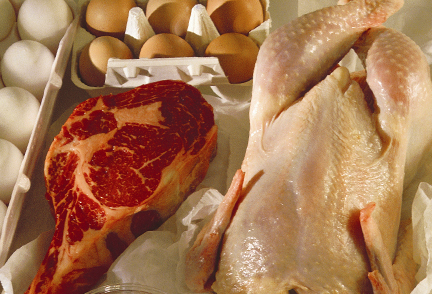 A quick drop in pounds makes an extreme low carb diet a tempting strategy for weight loss. However, this fixation on numbers is a poor way to judge results because the scale cannot tell you what kind of weight you are losing. If someone loses 7 pounds in 2 days on an extreme low carbohydrate diet, only 1- 2 pounds of this will be fat and the remaining 5-6 pounds will be in the form of lean muscle, water and minerals. Losing more muscle than fat is the least desirable thing to do while dieting because muscle is what burns the fat in the first place.
A quick drop in pounds makes an extreme low carb diet a tempting strategy for weight loss. However, this fixation on numbers is a poor way to judge results because the scale cannot tell you what kind of weight you are losing. If someone loses 7 pounds in 2 days on an extreme low carbohydrate diet, only 1- 2 pounds of this will be fat and the remaining 5-6 pounds will be in the form of lean muscle, water and minerals. Losing more muscle than fat is the least desirable thing to do while dieting because muscle is what burns the fat in the first place.
Any diet too low in carbohydrates will bring about a response similar to fasting. Some “extreme” low carb diets restrict your carbohydrate intake to 50 grams or less per day, a situation that shifts your body into the starvation mode, decreases your metabolism, and gives you a rotten temper. While drastically cutting out the carbs, these extreme low carb diet organizations go as far as suggesting liberal amounts of protein and fat. There is something unhealthy about eating high amounts of bacon and grease.
Your body has many vital functioning systems whose cells require a steady supply of carbohydrates, your brain being one of them. In fact, your entire central nervous system, retina cells, cells lining your small intestines, red blood cells which carry oxygen to all parts of the body, kidney tube cells and the cells of the pancreas, all absolutely require a steady supply of glucose. These cells can not store sugar and therefore must constantly draw it from the bloodstream.
If your body doesn’t obtain carbohydrates from the diet, they must come from somewhere else. In the first few days following an extreme low carb diet, the liver’s stores of sugar are depleted and the body has no other choice but to feed upon its muscles. Stress hormones trigger muscle cells into giving up their very own protein in an effort to provide the brain with fuel. The protein inside muscle cells is literally broken down and released into the bloodstream. The liver metabolizes these proteins into carbohydrates which the brain needs to remain consciously aware and awake. During the first few days of following an extreme low carb diet, your body gets 90% of its energy from protein. Burning your muscle is as useful as burning up the wood that makes up your house.
Your liver doesn’t only take protein from the muscles; it also takes it from blood proteins, immune system cells, as well as liver, heart and lung tissue. Since these organs are all made of protein, they must go too. Burning protein is a dirty process for the since it leaves behind toxic end products, which does not make protein a good energy source to fuel the activities of your body. Instead of specifically targeting fat cells, extreme low carb diets cause your body to break down as a whole. If this process continues, both muscle metabolism and fat loss will come to a halt.
Carbohydrates also need to be present when your body burns fat. Without enough carbohydrates, the fragments of fat metabolism combine with each other to form ketone bodies. Some nervous system cells are able to burn these ketone bodies as a backup fuel source, a process that allows you to live 6-8 weeks into fasting. When the levels of ketone bodies build up, your body is said to be in a state of ketosis. Ketosis will decrease metabolism, suppress appetite, add a fruity smelling odor to your breath and make your body quite acidic. Besides giving you bad breath, the nastiest consequence of an over-acidic body is that bacteria, fungus, molds and yeasts thrive in this type of atmosphere. To prevent ketosis your body requires at least 50-100 grams of carbohydrates per day.
The best way to understand what constitutes a carbohydrate is to define them as “anything that grows from the ground.” This includes fruits, vegetables and whole grains. The colorful nature of these foods seems to be nature’s way of telling us to eat these things. Carbohydrates only become a problem when they are manufactured away from their most natural state or when they’re eaten in excessive quantities.
Carbohydrates should no longer be feared, but respected as the main source of energy for the brain and central nervous system. Carbohydrates are also beneficial since they stimulate insulin, a pro-metabolic hormone that keeps protein inside your muscles, thus preventing muscle loss. By feeding your body the correct amount of carbohydrates, you will be able to maintain muscle metabolism in your body’s inside as you simultaneously shed the fat on the outside.
The Core Fat Loss plan recommends the perfect level of carbohydrates -not too high and not too low. The goal is to give yourself just enough carbohydrates to fuel your brain and central nervous system and to provide just enough insulin to prevent muscle breakdown.